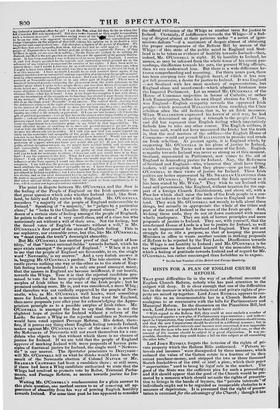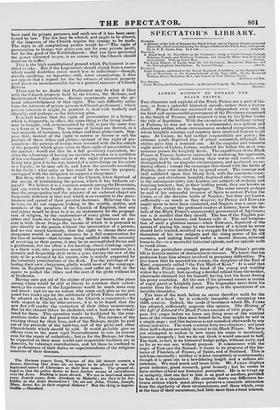HINTS FOR A PLAN OF ENGLISH CHURCH REFORM.
THAT great difficulties lie in the way of an effectual measure of English Church Reform, nobody who has paid attention to the subject will deny. It is clear enough that one of the difficulties lies in the manner in which ecclesiastical and private rights of pro- perty are mixed up together. Lord JOHN RUSSELL appears to con- sider this as an insurmountable bar to a Church Reform Act analagous to or coextensive with the bills for Parliamentary and Municipal Reform. In the discussion on the Pluralities Bill, last week, Lord JOHN is reported to have said- " With regard to the Reform Bill, they could at once exclude a number of boroughsand appoint a new plan of Parliamentary representation ; and with re- spect to Corporations, they could enact that all the old Corporations should cease, and that the new Corporations should be elected in a different manner ; but in this case, where private interests and incomes were concerned. it was impossible to say that the man who now held two benefices should fiofeit one, or that the amount of his income should be subject to a great diminution. It was im- possible, therefore, that they could frame a bill on this subject at all resembling the other bills."
Lord JOHN RUSSELL forgets the invasion of the rights of pri- vate property which the Reform Bills authorized. "Private in- terests and incomes" were disregarded by those measures, which reduced the value of the Gatton estate to a fraction of its then recent purchase-money, and stripped the two or three thousand Scotch freeholders of the 400/. or 500/. a piece, which their paper " superiorities " used to bring by legal sale in the market. The good of the State was the sufficient plea for such a proceeding; and ifit should appear that the good of the Church would be pro- moted by a measure which should set aside the rights of presenta- tion to livings in the hands of laymen, the "private interests" of individuals ought not to be regarded as insuperable obstacles to a measure of deprivation. It is presumed that the right of presen- tation is exercised for the advantage of the Ciurch ; though it has
been used for private purposes, and such use of it has been sanc- tioned by law. The law may be altered, and ought to be altered, if the interests of the Church require the change to be made. The reply to all complaining parties would be—" The right of presentation to livings was given you not for your private profit,
but for the good of the Establishment : that you have perverted the power intrusted to you, is no reason silly the Church should continue to suffer:' This is the high constitutional ground which Parliament is en- titled to take. But if the Legislature should shrink from a course which would doubtless cause much loss to individuals—though, strictly speaking, no injustice—still, upon examination, it does not appear that a regard for the lay owners of clerical property need prove an insurmountable bar to a general measure of Church Reform
There can be no doubt that Parliament may do what it likes with the Church property held by the Crown, the Bishops, and Ecclesiastical Corporations. Recent enactments prove the ge- neral acknowledgment of that right. The only difficulty arises fi ono the interests of private persons in Chureb preferment ; which private interests it might be prudent to deal with tenderly and liberally, and perhaps on Ihe following plan.
It is well known that the right of presentation to a living— which is frequently, in effect, the same thing as the living itself— may he bought, sold, or transmitted by will, in just the same way as a farm or a house. The incomes of livings are derived, in a vast majority of instances, from tithes and from glebe-lands. Sup- pose that, instead of the right to receive or bestow or sell the produce of these tithes and glebes—instead of' the right of pre- sentation—the patrons of livings were invested with the fee-simple of the property which gives value to their right of presentation in the maiket would not this be a full pecuniary equivalent, be- sides the advantage of having no services to render as a condition of the etnolument ? Any owner of the right of presentation to a living may give it to his son, instead of a rent-charge on his estate or a legacy; or he may sell it, and leave the proceeds according to his fancy: what more or less could he do were the property unclogged with the obligation to support a clergyman ?
But then, what is to become of the Church, when deprived of the means of maintaining the parson, which it has hitherto en- joyed? We believe it is a common remark among the Dissenters, and one which tells forcibly in favour of the Voluntary system, that the congregation and the minister of an endowed chapel are frequently deficient in that zeal which is so essential to the main- tenance and spread of their peculiar doctrines. Believing this to be true, we do not suppose, looking to the wealth, station, and numbers of the members of the Church of England, that any real injury would be done to it as an instrument for the propaga- tion of religion, by the confiscation. of every glebe and all the tithes and lands now belonging to it. But our business at pre- sent is with those livings the income of which it is proposed to give directly to the patron without the intervention of a parson; and we can assert fearlessly, that the right to choose their own clergyman would in many instances be a full compensation for the loss of income—that income being saddled with the necessity of receiving as their pastor, it may be an accomplished divine and a gentleman, but too often a fox-hunting, claret-drinking squire in a black coat, who preaches musty lithographed sermons in a slovenly and disgusting style twice a year, leaving the rest of the duty to be performed by his curate, who is mainly supported by the voluntary contributions of the flock. For the privilege of se- lecting their own clergyman, gladly would most of the congrega- tions in England pay him his salary, and suffer my lord or the squire to pocket the tithes and the rent of the glebe without let or hindrance.
Having once got rid of the claims of private persons, (the pious among whom would be still at liberty to continue their endow- ments,) the course of the Legislature would be much more easy and direct : and we see no reason why some such plan as we pro- posed two weeks ago for the settlement of Irish Tithes should not be adopted in England, as far as the Church is concerned,—for with respect to the lay tithe-owners, it is to be hoped that the new Act will render the extinction of their tithes unnecessary. But let the clerical tithes be abolished, and a land-tax be substi- tuted for them. This operation would be facilitated by the com- positions under the Act passed this session. The incomes of the existing clergy for their lives, and of the Bishops, might be paid out of the proceeds of the land-tax, and of the glebe and other Church-lands which should be sold. It would prubably give no offence even to the most rigid Nonconformist to vote an annual sum for the repair of cathedrals ; but as for the Bishops, let them be supported as their most useful and respectable brethren are in America, by voluntary contributions, and let them be confined to the performance of their duties as superintendents of the religious concerns of their dioceses.



























 Previous page
Previous page